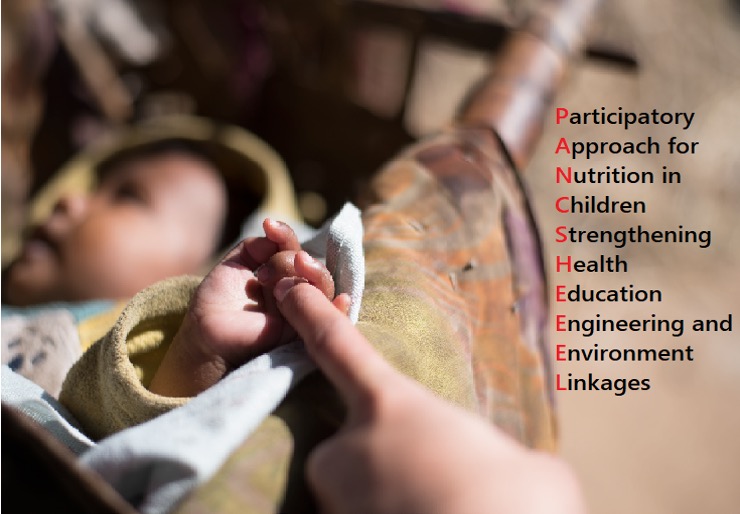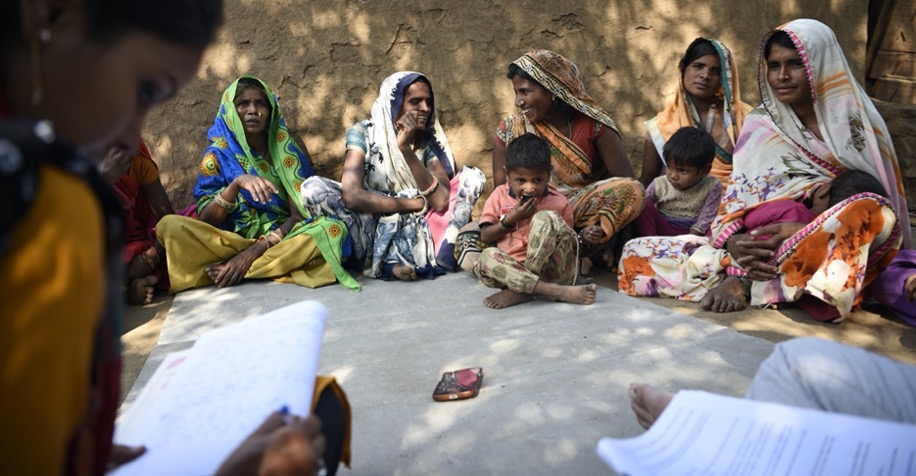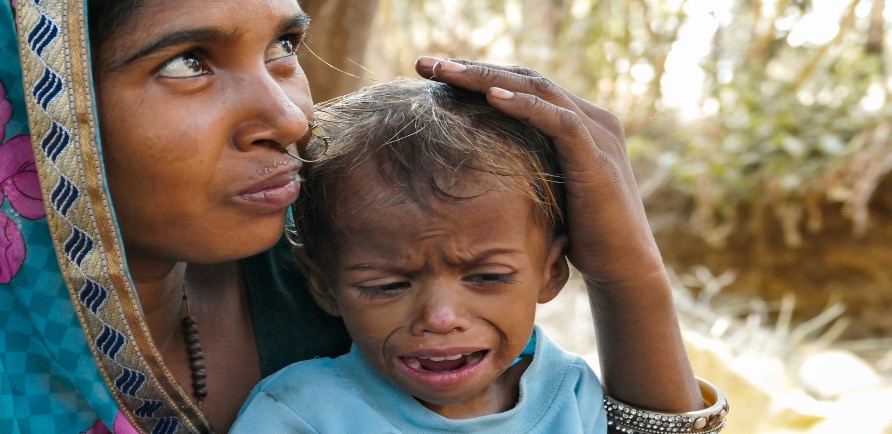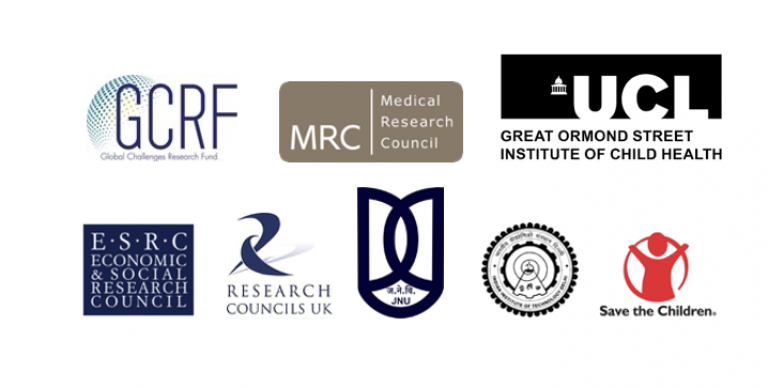 Photo credit | The PANChSHEEEL Team
Photo credit | The PANChSHEEEL Team
"A picture is worth a thousand words"
PANChSHEEEL (Participatory Approach for Nutrition in Children: Strengthening Health, Education, Environment and Engineering Linkages) is an interdisciplinary cross-sector project designed to explore health, education, engineering and environment (HEEE) factors that influence infant and young child feeding (IYCF) practices and nutrition in India.
The project sought to foster collaboration between the research team, local schools, Anganwadi Workers and communities to develop an integrated system that links HEEE solutions for optimization of ICYF in two villages of Banswara (Ghatol and Kushalgarh). PANChSHEEEL uses schools and Anganwadi centres as new innovation hubs for sustained community engagement, health promotion, and behaviour change.
The project established a multi stakeholder panel to address an extremely delicate stage for a new-borns cognitive and physical development. This panel included the local village community as collaborators with schools, Angadwadi workers (midwives) at the different centres, individual householders, community researchers and local community champions becoming key actors for bringing about impact and change. In order to mobilise the entire village to achieve an intervention that was truly designed with the people and for the people.
 Photo credit | The PANChSHEEEL Team
Photo credit | The PANChSHEEEL Team
The pictures from the PANChSHEEEL project and findings will also be exhibited as part of a virtual exhibition being planned for December 2020 titled 'The Early Years - A Window of Opportunity : A Global Art & Science Exhibition'.
Download a PDF version of the project photobook
Background
India has the highest burden of undernutrition in the world, hosting 30% of the world’s stunted children and nearly 50% of severely wasted children under the age of five. The World Bank has called the current landscape of childhood malnutrition “India’s silent emergency.”, with undernutrition contributing to almost half of the country’s under-five mortality, through direct and indirect means. According to the National Family Health Survey-4 data, only 9.6% of children aged 6 to 23 months in India receive a nutritionally adequate diet.
Find out more and watch the project film: https://www.pahus.org/panchsheeel-project
Project Overview
PANChSHEEEL was a 5-phase formative project, conducted in Banswara District in Rajasthan state in India.
Phase 1 focused on identifying and documenting the local practices with regard to feeding practices, sanitation, access to local resources (such as energy and water) and educational practices in relation to infants and young children aged 6-24 months, as well as mapping existing Government of India initiatives in the study sites.
Phase 2 involved extensive field work to identify the local challenges, drivers, resources, opportunities and needs for children in the first 6-24 months of life at individual, household, community and environmental level.
Phases 3, 4 and 5 focused on the analysis and mapping of HEEE linkages, intervention design and implementation, as well as review and dissemination phases of this study.
The Objective
The aim of the project was to develop a socio-culturally appropriate, tailored, integrated and interdisciplinary intervention in rural India and test its acceptability for delivery through Anganwadi Centres and schools.
The links between infection, undernutrition, feeding practices and child development are well established and are influenced by a complex array of interrelated factors, highlighting the need for an integrated approach. The CODE FASTER principles guided each phase of the project to ensure the tailored intervention was co-designed, feasible, acceptable, sustainable, scalable, targeted, equitable and resource efficient.
 Photo credit | The PANChSHEEEL Team
Photo credit | The PANChSHEEEL Team
The Methodology
A mixed methods approach with both quantitative and qualitative aspects was adopted to assist understanding of the multitude of factors that influence IYCF practices. Quantitative data was collected through a household survey and maternal time use survey in households with children under two years of age. Qualitative data was collected using two methods:
1. Key Informant Interviews with the Anganwadi Workers and the Accredited Social Health Activists, Auxiliary Nurse Midwives, Elected Panchayat Representatives and School teachers
2. Focus Group Discussions with mothers and grandmothers of children 0-2 years of age.
A social mapping and transect walk exercise was also conducted in each of the nine study villages to map resources related to Water, Sanitation and Hygiene as well as energy that are environmental influencers of risk of infection.
The Findings
Through these mixed methods, different perspectives and data was obtained on IYCF and care practices, such as:
1. Early initiation and exclusive breastfeeding
2. Complementary feeding and
3. Other practices for proper growth and development of the child, environmental factors, available resources (e.g. time, food, milk) which all may collectively contribute to malnutrition.
Further Reading
To find out more please visit the UCL project page HERE
For any further project enquiries please contact the Principal Investigator: Prof (Dr) Monica Lakhanpaul, Professor of Integrated Community Child Health, UCL Great Ormond Street Institute of Child Health at m.lakhanpaul@ucl.ac.uk
Project Team
Co-Investigators: Prof. Marie Lall, Institute of Education, UCL • Dr. Priti Parikh, Civil Environmental and Geomatic Eng, UCL • Dr. Lorna Benton UCL, Great Ormond Street Institute of Child Health • Prof. Rajib Dasgupta, Centre for Social Medicine & Community Health, Jawaharlal Nehru University • Prof. Virendra Kumar Vijay, Indian Institute of Technology Delhi • Dr. Rajesh Khanna, Save the Children, India • Dr. Hanimi Reddy, Save the Children, India • Dr. Logan Manikam, UCL Great Ormond Street Institute of Child Health
UCL University College London: Ms. Meghan Cupp • Ms. Laura Swabey • Dr. Kartik Sharma
Save The Children: Mr. Sanjay Sharma • Ms. Susrita Roy • Ms. Neha Santwani • Mr. Satya Prakash Pattanaik • Ms. Priyanka Dang • Mr. Hemant Chaturvedi • Mr. Hemant Acharya • Mr. Pramod Pandya • Mr. Taul Singh • Ms. Kamla Damor
Indian Institute of Technology: Ms. Namrata Agrahari • Dr. Nandan Srivastava
Research Partners: Ms. Ritu Chhabria, Mukul Madhav Foundation (Team incl. Ritu Prakash) • Dr. Sai Lakshmi, EKAM Foundation (Team incl. Ms. Neeta Karal Nair, Mr. Manoharan, Dr. Sathya Jegannathan and Ms Benita) • Dr. Nerges Mistry, Foundation for Research in Community Health India (team incl. Dr. Shilpa Karvande) • Dr. Nayreen Daruwalla and Prof. (Dr.) David Osrin, Society for Nutrition Education & Health Action (SNEHA) • Prof. (Dr.) Anita Saxena, All Indian Institute of Medical Sciences (AIIMS)
Technical Advisory Board: Mr. Anand Karve • Prof. V M Chariar • Prof. T. Sundararaman • Dr. Ian Warwick • Dr. Ramesh Mehta •Prof. (Dr.) Atul Singhal • Mr. John Pelton • Prof. Sachin Maheshwari • Dr. Sofia Strummer • Dr. Amita Kashyap
British-Indian PPI Diaspora Panel: Ms. Rita Khandelwal • Ms. Ratika Puri Kapur • Mr. Ashok Khandelwal • Mr. Rajay Narain • Mr. Sanjay Dhir • Mr. Himanshu Parikh
Photo Contributions: Dhruv Star
Project Partners
Funded by the Global Challenges Research Fund (GCRF) and Medical Research Council (MRC), AHRC, BBSRC, ESRC and NERC, the PANChSHEEEL study was a collaboration between University College London (UCL), Save the Children, India, Jawaharlal Nehru University (JNU) and Indian Institute of Technology (IIT), Delhi.
PANChSHEEEL gratefully acknowledges the input from our community champions and field team, which made this project possible. This work was supported by the Global Challenges Research Fund and funded by the MRC, AHRC, BBSRC, ESRC and NERC [grant number: MR/P024114/1].

This work is licensed under a Creative Commons Attribution 4.0 International License


Please Sign in (or Register) to view further.